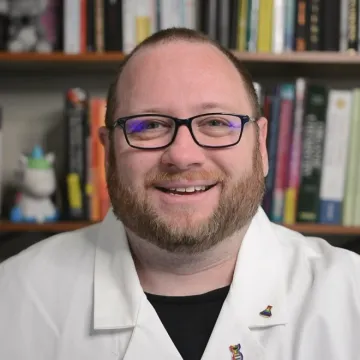When
Presenter:
Dr. Jeffrey Raker
Associate Professor, Department of Chemistry, University of South Florida
Abstract:
Learning is a difficult, multidimensional process; educators have a responsibility to be aware of our students’ learning progress and respond to that awareness in ways that further promote learning. For the Raker Research Group, we are focused on understanding how novices develop and use the language of organic chemistry, i.e. how learners come to make sense of reaction mechanisms. This broader outcome for our course requires the activation and integration of multiple concepts and skills that have been shown to be difficult for learners.
The focus of our work is on foundational concepts including acidity and basicity, and nucleophiles and electrophiles in the context of studying how learners make sense of mechanisms. We develop rubrics to measure learning and evaluate instruction, and construct learning experiences that supplement and complement instruction. We have been successful in using our rubrics to develop computer-based scoring models to evaluate 20,000+ written reaction mechanism explanations across the undergraduate organic chemistry curriculum. For our Lewis acid–base scoring model, we have demonstrated that the model can be deployed in adaptative tutorials to provide and promote targeted learning.
While our work has specifically focused on organic chemistry, implications of our work extend to all areas of chemistry: to provide meaningful learning experiences for our students, we must have good tools to measure learning and work to create experiences that better and best promote that learning. Thus, molecular orbital diagrams in inorganic chemistry, phase diagrams in physical chemistry, or enzyme-substrate kinetics in biochemistry, for example, all provide contexts in our courses for reflecting on and responding to learning that requires integration of concepts and skills similar to how we do chemistry.
Biosketch:

Jeff (he/him/his) is an Associate Professor in the Department of Chemistry at the University of South Florida, having joined the faculty as an Assistant Professor in 2013.
He received his undergraduate degree in chemistry at Ohio Northern University (Ada, Ohio) in 2003, and a Master of Arts degree in college student personnel at Bowling Green State University (Bowling Green, Ohio) in 2005. Jeff obtained a Ph.D. in chemistry from Purdue University (West Lafayette, Indiana) in 2011 working with Professor Marcy Towns.
He was a postdoctoral research associate with the ACS Examinations Institute (hosted by Iowa State University at the time) from 2011 to 2013 with Professor Thomas Holme. Jeff additionally served as Associate Director of ACS Exams from 2015 to 2023.
Jeff has authored and collaborated on over 70 peer-reviewed publications (Google Scholar), contributed chapters to revised editions of the ACS Exams General Chemistry and Organic Chemistry Study Guides, given over 20 invited seminars and research talks, and contributed to over 120 conference talks, papers, and posters.
Hosted By:
Dr. Amy Graham






